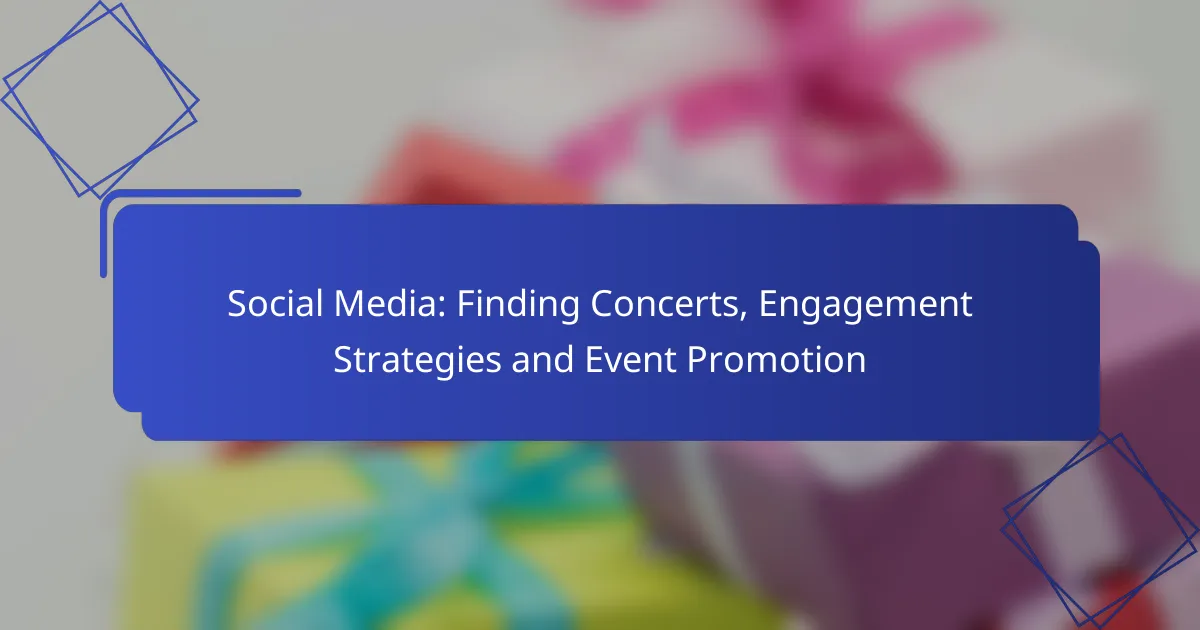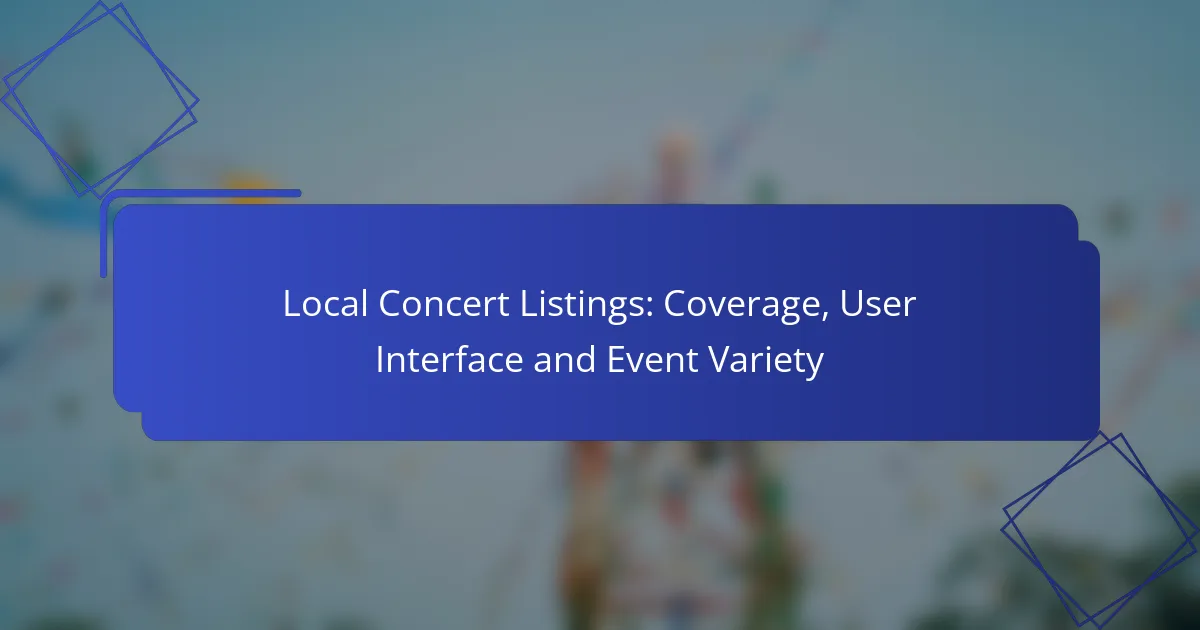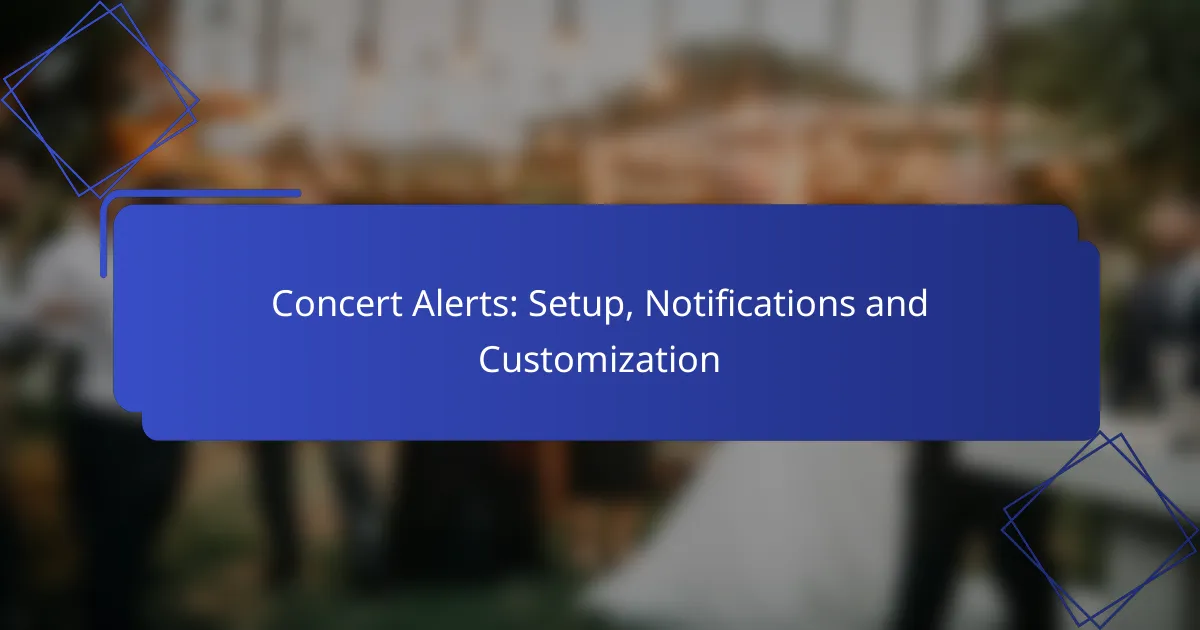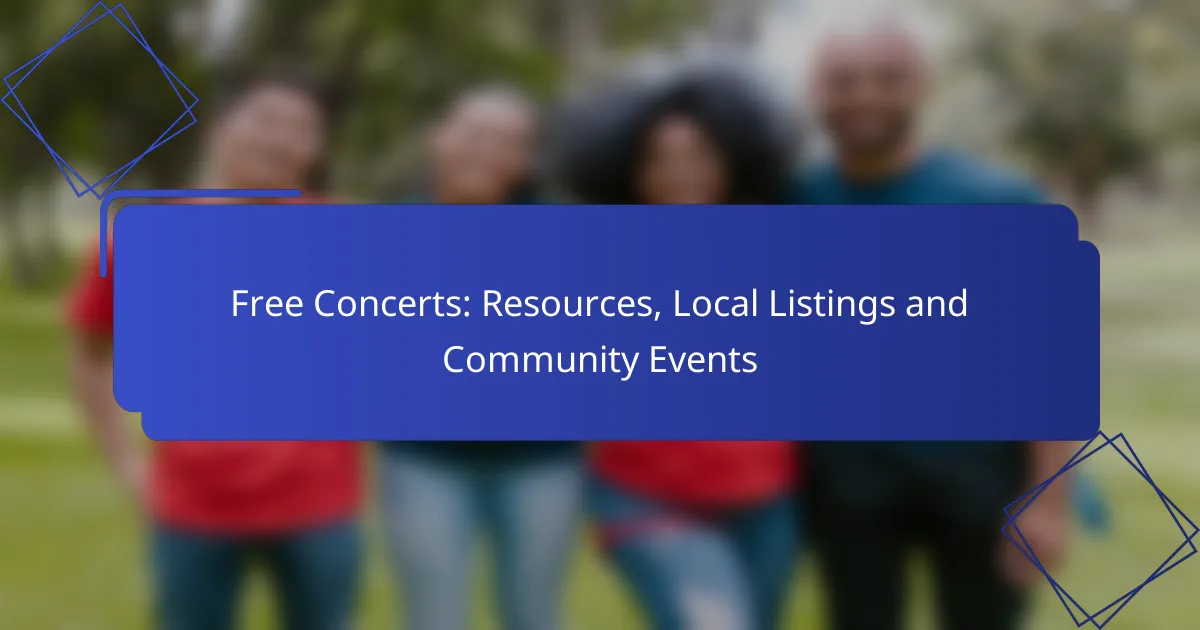Social media serves as a powerful tool for discovering concerts, connecting with artists, and engaging with fellow fans. By utilizing event listings, hashtags, and community posts, you can effortlessly stay informed about upcoming events. Additionally, effective engagement strategies, such as interactive content and targeted promotions, can enhance audience participation and drive ticket sales, creating a vibrant community around your favorite concerts.
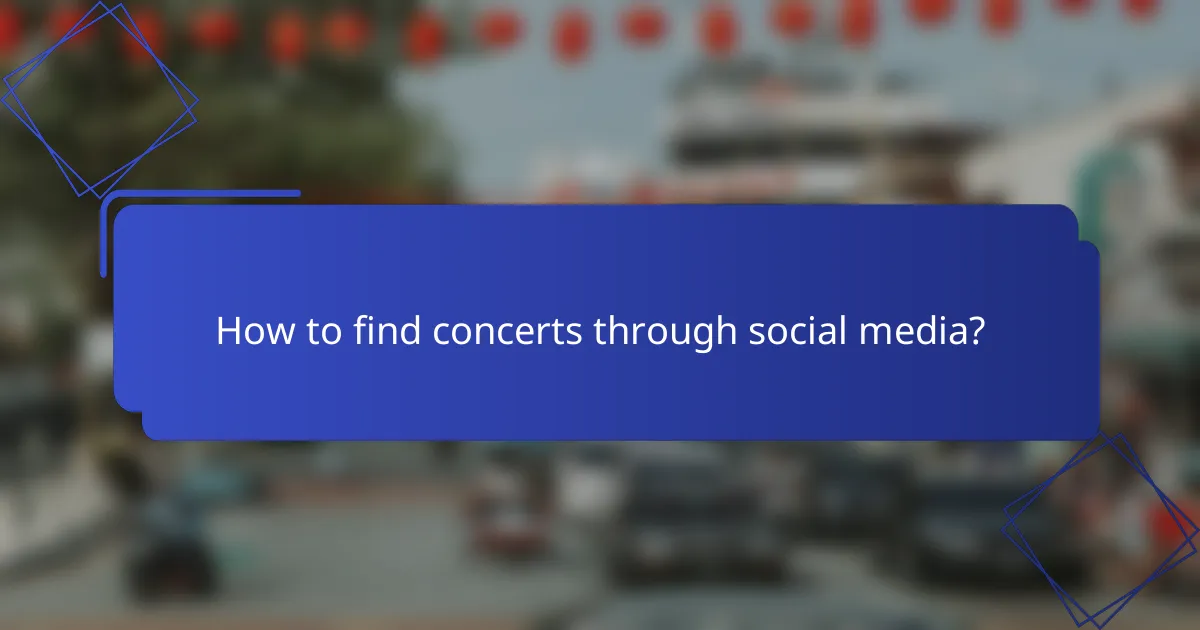
How to find concerts through social media?
Finding concerts through social media involves leveraging various platforms to discover events, connect with artists, and engage with fellow fans. By utilizing features like event listings, hashtags, and local community posts, you can easily stay updated on upcoming concerts in your area.
Using Facebook Events
Facebook Events is a powerful tool for discovering concerts, as many artists and venues create event pages to promote their shows. You can search for events based on your location, interests, and friends’ activities, making it easy to find concerts that match your preferences.
To maximize your experience, regularly check your event feed and RSVP to shows you plan to attend. This not only helps you keep track of your plans but also allows Facebook to recommend similar events based on your interests.
Leveraging Instagram hashtags
Instagram hashtags are a great way to find concerts and live music events. By searching for tags like #ConcertsIn[YourCity] or #[ArtistName]Live, you can discover posts from fans and venues that highlight upcoming shows.
Engage with posts by liking and commenting to connect with other concert-goers. Following artists and local venues can also keep you informed about their latest announcements and ticket sales.
Exploring Twitter for local events
Twitter is an effective platform for real-time updates on concerts and events. By following local music venues, artists, and event promoters, you can receive instant notifications about new shows and ticket releases.
Utilize location-based searches or trending hashtags to find concerts happening nearby. Engaging in conversations with other users can also lead to discovering hidden gems and smaller local performances.
Utilizing Eventbrite for social sharing
Eventbrite is a popular platform for event promotion, including concerts. You can browse through a wide range of events based on your interests and location, making it easy to find shows that appeal to you.
When you find an event you like, share it on your social media to invite friends and increase visibility. Additionally, consider signing up for notifications from Eventbrite to stay updated on new concerts and ticket sales in your area.
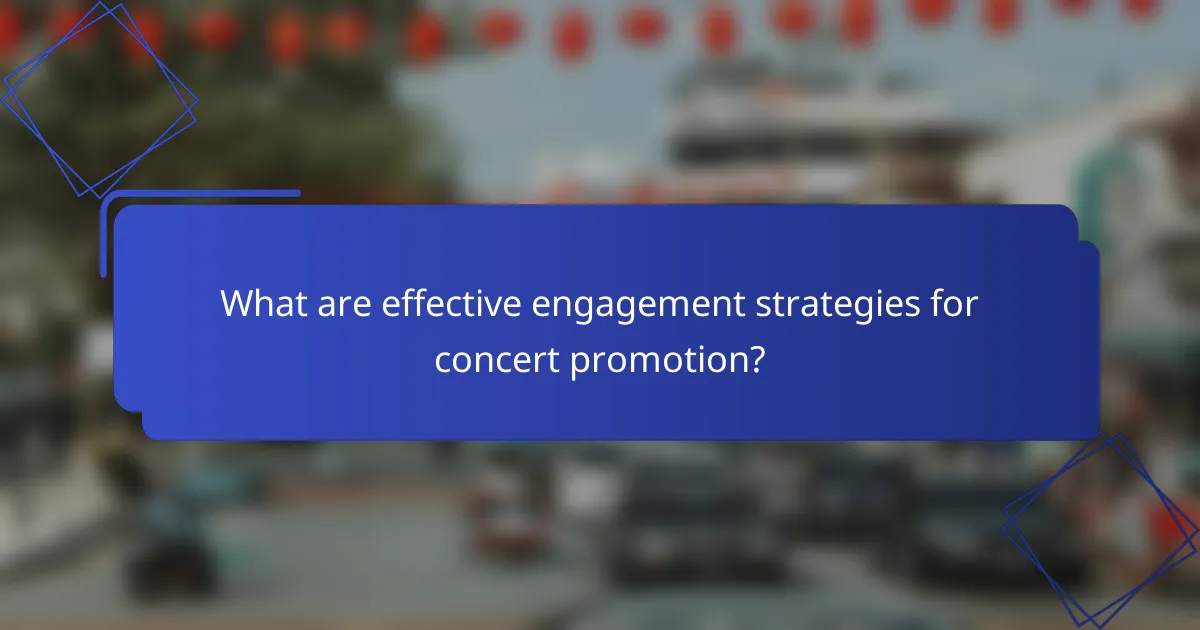
What are effective engagement strategies for concert promotion?
Effective engagement strategies for concert promotion include interactive content that encourages audience participation and builds excitement. By leveraging social media platforms, promoters can create a sense of community and anticipation around events, ultimately driving ticket sales.
Creating interactive polls on Instagram
Interactive polls on Instagram are a powerful way to engage your audience and gather insights about their preferences. You can ask questions related to setlists, merchandise, or even venue choices, allowing fans to feel involved in the concert planning process.
To maximize engagement, keep polls simple and visually appealing. Use Instagram Stories to create quick, easy-to-answer polls that can capture the attention of your followers. Aim for a frequency of one poll per week leading up to the concert to maintain interest.
Hosting live Q&A sessions on Facebook
Live Q&A sessions on Facebook provide a platform for fans to interact directly with artists or promoters, fostering a deeper connection. These sessions can cover topics like behind-the-scenes insights, concert preparations, or even personal stories from the artists.
Schedule these sessions at a time when your audience is most active, typically evenings or weekends. Promote the event in advance to build anticipation, and consider offering exclusive content or merchandise giveaways during the session to encourage participation.
Utilizing TikTok challenges for audience engagement
TikTok challenges can create viral moments that significantly boost concert visibility and engagement. Encourage fans to participate in a dance or creative challenge related to your concert, using a specific hashtag to track entries.
Set clear guidelines for the challenge and consider collaborating with influencers to expand your reach. Offer incentives, such as free tickets or meet-and-greet opportunities, to motivate participation and generate excitement around your event.

How to promote events on social media?
Promoting events on social media involves strategic use of platforms to reach your target audience effectively. This can include various methods such as targeted ads, influencer collaborations, and engaging content like countdowns to create excitement.
Using targeted ads on Facebook
Targeted ads on Facebook allow you to reach specific demographics based on interests, location, and behaviors. This precision helps ensure that your event promotion reaches individuals most likely to attend.
To set up a targeted ad, create an engaging visual and a clear call-to-action. Allocate a budget that suits your goals, typically starting from a few dollars a day, and monitor performance to adjust your strategy as needed.
Collaborating with influencers for reach
Partnering with influencers can significantly expand your event’s visibility. Influencers have established trust with their followers, making their endorsements more impactful.
Choose influencers whose audience aligns with your event’s target demographic. Offer them incentives such as free tickets or exclusive access, and encourage them to share their experiences leading up to the event to generate buzz.
Creating event countdowns on Instagram Stories
Instagram Stories are an effective way to build anticipation for your event through countdowns. This feature allows you to engage your audience daily as the event date approaches.
Utilize eye-catching graphics and interactive elements like polls or questions to keep your audience engaged. Aim to post countdowns regularly in the weeks leading up to the event to maintain interest and remind followers to mark their calendars.
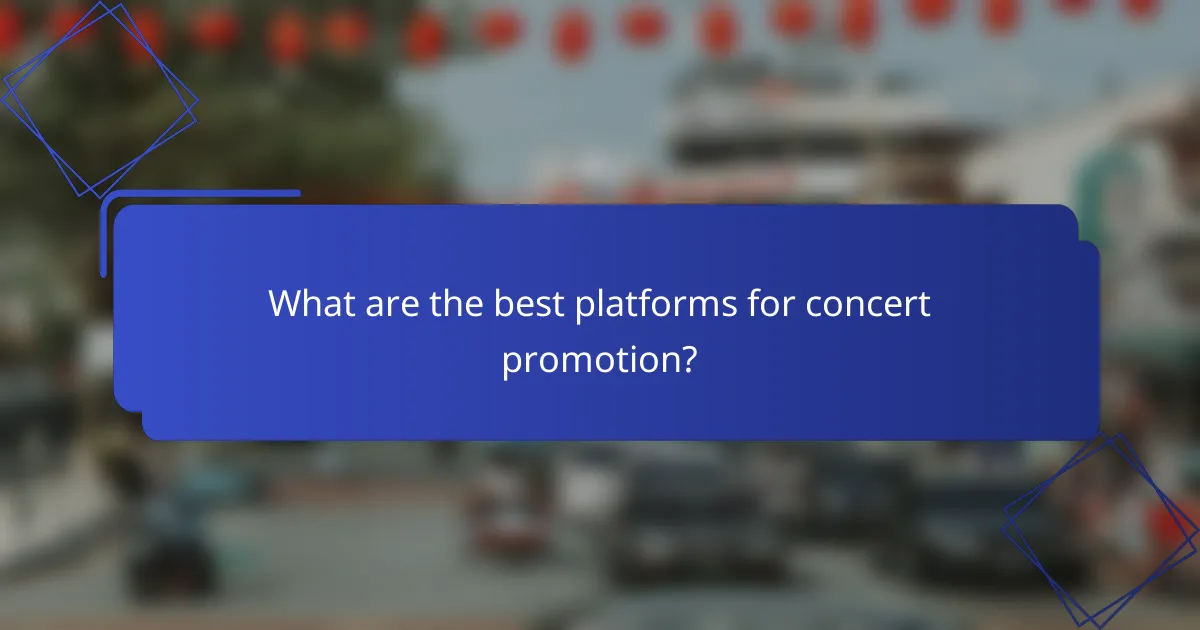
What are the best platforms for concert promotion?
The best platforms for concert promotion include Facebook, Instagram, and Twitter, each offering unique features that cater to different aspects of event marketing. Utilizing these platforms effectively can significantly enhance visibility and engagement for concerts.
Facebook for event creation
Facebook is a powerful tool for concert promotion, particularly for creating and managing events. Users can set up an event page, invite friends, and share details such as location, time, and ticket links, making it easy for attendees to RSVP.
To maximize reach, consider using Facebook Ads to target specific demographics based on interests, location, and behaviors. This can help ensure that your concert reaches the right audience, increasing the chances of ticket sales.
Instagram for visual storytelling
Instagram excels in visual storytelling, making it ideal for promoting concerts through eye-catching images and videos. Share behind-the-scenes content, artist highlights, and engaging stories to build excitement and connect with potential attendees.
Utilize Instagram Stories and Reels to create dynamic content that showcases the concert experience. Engaging with followers through polls and questions can also foster a sense of community and anticipation leading up to the event.
Twitter for real-time updates
Twitter is best for real-time updates and engaging with fans during concerts. Use it to share important announcements, such as ticket availability or last-minute changes, and encourage attendees to tweet about their experiences using a specific hashtag.
To keep your audience engaged, post regular updates leading up to the event, including countdowns and artist interactions. This can help maintain interest and encourage followers to share your posts, expanding your reach further.
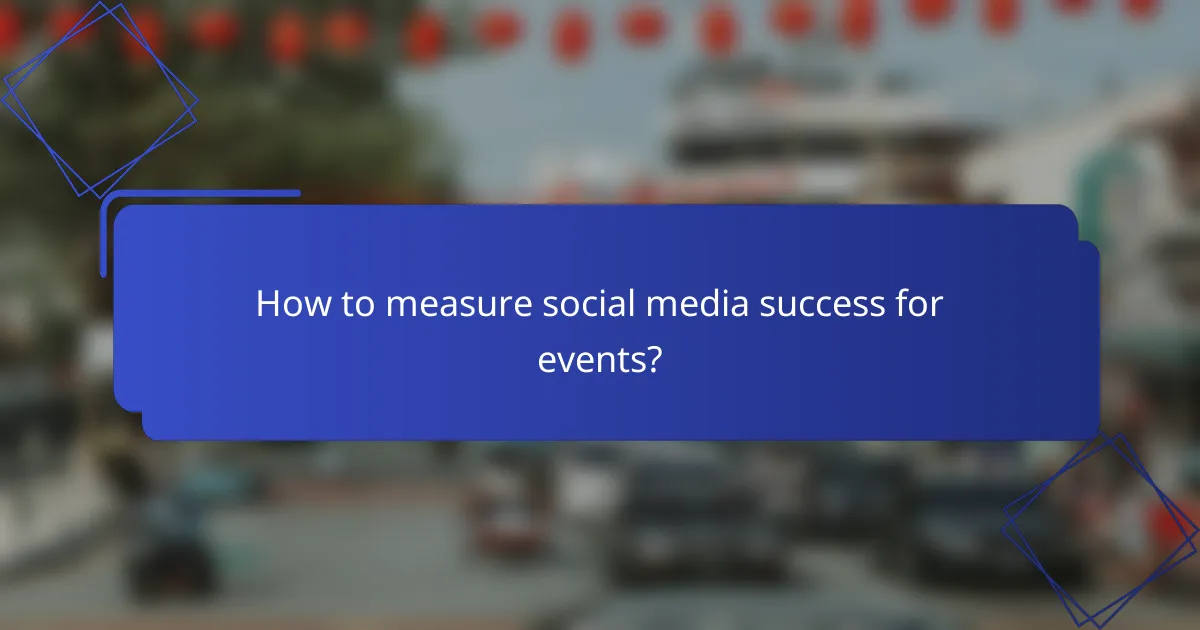
How to measure social media success for events?
Measuring social media success for events involves analyzing various metrics that reflect engagement and conversion. Key indicators include likes, shares, comments, and ticket sales directly linked to social media campaigns.
Tracking engagement metrics
Engagement metrics are crucial for understanding how well your event resonates with your audience. Focus on likes, shares, comments, and reach to gauge interest and interaction levels. Tools like Facebook Insights and Twitter Analytics can provide detailed data on these metrics.
Consider setting specific goals for each metric, such as aiming for a certain percentage increase in shares compared to previous events. Regularly monitor these metrics to adjust your strategies in real-time.
Analyzing ticket sales linked to campaigns
Linking ticket sales to specific social media campaigns helps assess their effectiveness. Use unique tracking links or promo codes to identify which platforms drive the most sales. This approach allows you to allocate your marketing budget more effectively.
For example, if a campaign on Instagram generates significantly more ticket sales than one on Facebook, you might choose to invest more in Instagram for future events. Regularly review sales data to refine your promotional strategies.
Using social listening tools for feedback
Social listening tools enable you to monitor conversations about your event across various platforms. Tools like Hootsuite or Brandwatch can help you track mentions, sentiment, and feedback from attendees and potential attendees.
By analyzing this feedback, you can identify areas for improvement and understand audience preferences. Responding to comments and addressing concerns can enhance your brand’s reputation and foster community engagement.
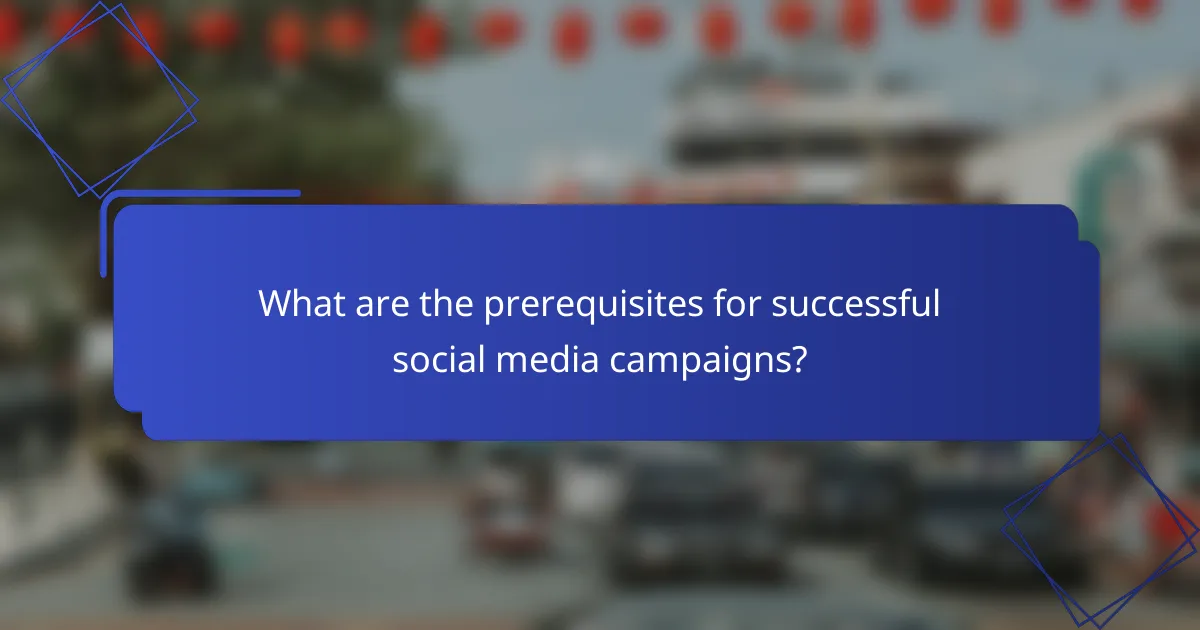
What are the prerequisites for successful social media campaigns?
Successful social media campaigns require a clear strategy, defined objectives, and an understanding of the target audience. These elements ensure that the campaign resonates with users and achieves desired engagement levels.
Defining target audience demographics
Understanding target audience demographics is crucial for tailoring social media campaigns effectively. This involves identifying characteristics such as age, gender, location, interests, and online behavior, which can significantly influence engagement and conversion rates.
To define your audience, consider using tools like social media analytics and surveys. For example, platforms like Facebook and Instagram provide insights into the demographics of your followers, helping you adjust your content to better suit their preferences.
When creating content, remember to align it with the interests and needs of your target demographics. This might involve using specific language, visuals, or themes that resonate with them, ultimately driving higher engagement and participation in your events.
